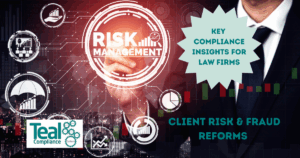As regulatory frameworks have evolved over the years, law firms have increasingly had to grapple with the challenge of managing Client Due Diligence (CDD) requirements. The introduction of the Money Laundering Regulations in 2003 was an important moment in this transformation. In response, many legal practices, including mine at the time, ended up establishing a dedicated centralised CDD team.
These teams emerged out of a need to streamline the cumbersome process that lawyers found themselves caught up in when conducting CDD. To facilitate this, we integrated ID searches into our case management system. This approach allowed the centralised team to handle the task of verifying client identities electronically, except in the case of conveyancing, due to the provisions of the CML Handbook, where documents were still needed.
The centralised team’s process was relatively straightforward: gather client information, attempt electronic verification, and when necessary, directly contact the client for additional details. Once all necessary data was gathered, it was forwarded to the lawyers.
However, a recent interaction with a former trainee, now a Money Laundering Reporting Officer (MLRO) at his firm, underscored a significant challenge: even when provided with detailed information about their corporate clients, lawyers often file this information away without a thorough review.
Moreover, many firms are struggling with properly conducting matter risk assessments. As revealed by regulatory findings, these assessments are not consistently completed, or accurately so, by the lawyers. This happens often because of an assumption that the central team is responsible for it.
This conundrum often raises a common question: how to strike a balance between central team assistance and lawyers’ duties? Here are a few pointers:
Manage Expectations: It’s essential to accurately represent the central team’s scope of work. Sometimes, in an effort to secure budgetary approval, the expected reduction in lawyer involvement is overstated. This can lead to lawyers presuming they are completely absolved from Anti-Money Laundering (AML) duties – A “get out for AML free” card if you will!
Clarity of Roles: Lawyers should have a clear understanding of their responsibilities. Generalised instructions, such as “conduct a risk assessment”, may not be sufficient. To ensure accuracy, break down the process into detailed steps. If possible, incorporate these steps into your routine procedures.
Prompt lawyers to prove they’ve done it: Assigning tasks that compel lawyers to engage with the information sent by the central team as part of the ongoing risk assessment process is crucial. This ensures active participation and reinforces the importance of their role in the CDD process.
Central Team Training: Central teams may often comprise individuals new to the legal sector. They may not fully comprehend what the lawyers need or the nature of information that lawyers are likely to possess. Hence, training them about the firm’s legal practices can improve their ability to anticipate and obtain necessary data.
The above suggestions serve as a starting point to bridge the divide between central teams and lawyers in the world of CDD. The ultimate aim is to ensure an efficient, effective CDD process that also ensures compliance with regulatory requirements and stops baddies from getting through!
Get in touch
If you need advice or guidance with AML compliance, we’re here to help you. Simply get in touch with one of our friendly experts today.




